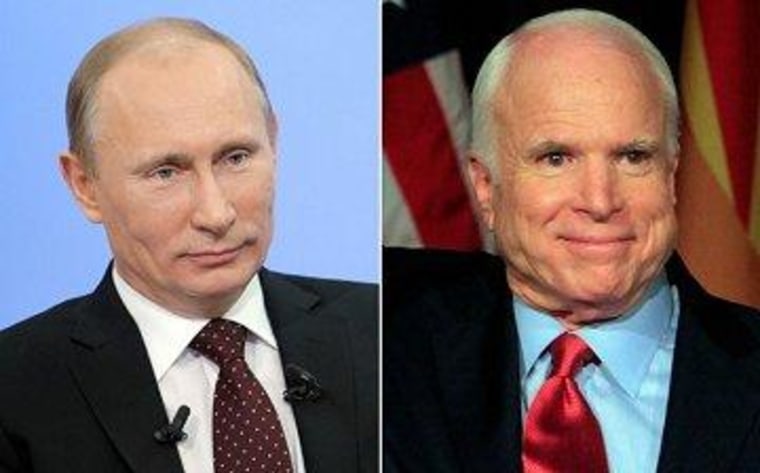On the one hand, the Beltway conventional wisdom is that President Obama erred terribly in Syria by getting everything he wanted without firing a shot. To his credit, David Ignatius marveled at the bizarre dynamic in his column today: Obama "can propose what the country wants, succeed at it and still get hammered as a failure."
On the other hand, the Beltway conventional wisdom is that Sen. John McCain (R-Ariz.) is a foreign policy expert, despite evidence to the contrary.
Take today, for example. McCain was so incensed by Russian President Vladimir Putin's recent New York Times op-ed that chided the U.S. that McCain said he'd love to respond in kind with a piece in Pravda. As it turns out, the editors obliged, publishing a retaliatory op-ed from McCain titled, "Russians Deserve Better Than Putin" for Russia's Pravda.
Except, McCain didn't exactly write for the Pravda he was looking for. The Communist newspaper he thought he was writing for shut down years ago -- in McCain's mind, the Cold War is forever -- and the senator ended up writing for website with the same name that Slate describes as "kind of cross between WorldNetDaily and the National Enquirer."It was one of those minor details McCain and his team forgot to check in advance.
So, the senator's public-relations offensive got off to an awkward start. At least the op-ed itself was a worthwhile endeavor, right? Well, no, that's not quite right, either.
Max Fisher explained well that McCain seemed to miss the point of Putin's piece entirely.
The Russian president's New York Times column was not an appeal to Americans to oppose their government outright, nor was it an argument that President Obama is bad and that Putin knows better. That was McCain's approach; Putin, rather, made an effort to speak to Americans in their own vernacular, appealing very narrowly to an ongoing U.S. debate over whether or not to strike Syria. With the exception of one strange paragraph deriding "American exceptionalism," Putin focused on gently calling attention to points and ideas that were already common features of the U.S. debate over Syria. His goal, it seems, was to put his thumb on the preexisting American debate, one that was already tipping in his direction. And he held back from lecturing Americans or telling them what to do.Putin's op-ed, in other words, was an act of savvy if cynical public diplomacy. It was an effort to ever-so-slightly tilt American domestic politics in a direction that would be favorable to Russian foreign policy.... McCain seems to have taken a very different approach.
They're actually opposites in every meaningful way. While Putin tried to be clever, McCain tried to be blunt, criticizing Russia's economy and international standing to a Russian audience. Putin was vaguely complementary of the U.S. leadership, saying, "My working and personal relationship with President Obama is marked by growing trust." McCain, meanwhile, condemned Putin directly and personally, questioning his commitment to his own people.
McCain concluded that he, not Putin, knows what's best for Russians.
It's almost as if the Republican senator wanted to do the Russian president a favor, encouraging Russians to rally defensively around their own countryman in response to insulting criticism from a condescending American outsider.
Many Republicans in recent weeks have insisted that Putin got the better of Obama. I find that hard to take seriously, though if Republicans are prepared to talk about Putin getting the better of McCain, we'll find plenty of common ground.
